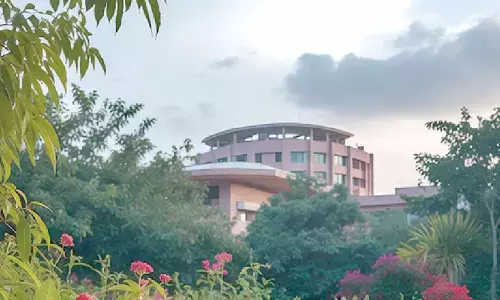Asymptomatic patient successfully undergoes thumb re-implantation surgery

Manipal Hospitals
People working with sharp instruments are at a high risk of laceration, crush injury and amputation at workplace.
Bengaluru: People working with sharp instruments are at a high risk of laceration, crush injury and amputation at workplace. In several cases the injuries might lead to the amputation, as happened in the case of 30-year-old Akshay (name changed), who was rushed to Manipal Hospitals, Old Airport Road, on January 7, after he severed his right thumb while working with a hydraulic press. His thumb was so badly injured that it was hanging by skin with all blood supply cut off to the area.
Highlighting the importance of immediate medical attention in improving the success rate of plastic surgery in such emergencies, Dr Srikanth V, Consultant, Plastic, Reconstructive & Cosmetic Surgery, Manipal Hospitals said, "There were not many cases of workplace amputation during the lockdown as most factories were closed. The number of such cases began to rise after the restrictions were lifted. In most cases there is a malfunctioning of the safety protocols while hoarding industrial machinery."
After a thorough physical examination and necessary blood investigations, the patient was rushed to the operation theatre for a complicated thumb reimplantation surgery lasting for about 3-4 hours under general anaesthesia. The patient did not have any comorbid illness. As a routine procedure, his throat swab was also sent for Covid-19 test. However, due to the emergency, the patient was taken to the operation theatre without waiting for the report.
"Medical emergencies cannot wait, Even though the Covid-19 test report was pending all the doctors, nurses and the technicians involved in the OT were in PPE's as part of SOP. The patient was asymptomatic and we went ahead with general anaesthesia. We also kept the patient in the isolation ward for recovery post-surgery, He tested positive on the day of the surgery," Srikanth said.
The patient's Covid test results came positive while the surgery was in progress, but as he was asymptomatic, it did not impact his recovery. During the surgery, the doctors repaired the arteries, veins, bones and the tendons one by one. Finally, the skin of the thumb was closed through sutures, and the dressing was done. The surgery was uneventful, and the patient tolerated the surgery well. The doctors suggest that care-giver education plays a huge role in determining the success of reconstruction surgeries as during an emergency arises, caregivers must immediately attend to the patient and provide necessary first-aid followed by rushing him to the nearest hospital for further management.
"Another important factor is the way the severed organ is brought to the hospital. Ideally, it should be wrapped in a clean cloth, put in a plastic bag and then placed in an icebox. The organ should not be placed directly in the ice, as it may result in frost-bite and damage the tissues permanently. This reduces the success rate of reconstruction surgery. The severed organ if attached back in its original position within 6 hours after the injury is associated with the best outcomes," Srikanth said.
He explained the reason behind workplace amputation being a debilitating and stressful condition. "There is a 40% reduction in hand functions due to thumb amputation. Reconstruction surgery is an important medical intervention in such cases. Approximately 92% of the patients are eventually satisfied with the appearance and the functioning of the replanted body parts. About 45% of the patients with a successfully replanted finger, toe, or hand require secondary surgery. In this case, the patient recovered well. Taking the patient to the hospital as soon as possible, conserving the severed organ through the right technique, and communicating the situation to the emergency department of the hospital, highly impacts the success of such reconstruction surgery," he elaborated.

















